
A fresh wave of anger has erupted in Ada following media reports confirming that several chiefs who recently embarked on a lavish trip to the Safari Valley Resort have officially declared their support for ElectroChem Ghana Limited — the controversial private salt mining company operating in the Songor Lagoon.
This confirmation, which validates long-standing suspicions of covert alliances between ElectroChem and a section of the Ada Traditional Council, has sparked outrage among aggrieved chiefs, elders, and youth across the traditional area, who now accuse the leadership of “selling Ada for personal gain.”
“Our fears have been confirmed. The trip to Safari Valley wasn’t for any workshop — it was a bribe in disguise,” said a furious Asafoatse from the Songor.
“The chiefs have taken sides with the company that has brought suffering and displacement to our people.”
The revelation comes after speculation that ElectroChem Ghana sponsored the traditional leaders’ trip to the luxury resort in the Eastern Region. The trip, initially presented as a “capacity-building program” by the Greater Accra Regional House of Chiefs, was heavily criticised by residents who saw it as a betrayal of trust, especially amid social and environmental tensions in the area.
Many believe the trip was used to co-opt key traditional leaders and secure their endorsement for ElectroChem’s activities in the Songor salt belt — a resource that historically belongs to the people of Ada and is central to their livelihood and heritage.
“This is nothing short of treason against our land and our ancestors,” lamented Asafoatser Songor I, a traditional youth voice and cultural advocate. “They have traded the soul of Ada for salt. While our communities flood, our livelihoods vanish, and our traditions decay, our so-called leaders dine at luxury resorts with those taking everything from us.”
ElectroChem Ghana Limited, owned by businessman Daniel McKorley (popularly known as McDan), has faced stiff opposition since it began operations in the Songor Lagoon area. Residents in affected communities, including Salom, Madagber, and Toflokpo, have decried the environmental degradation, limited access to salt pans, and loss of livelihoods caused by the company’s activities. Human rights groups and media investigations have previously highlighted forced evictions and rising tensions between local youth and private security operatives deployed to protect company interests.
With this public endorsement by the chiefs, many fear that the door is now wide open for the company to fully take over Songor, with little to no resistance from traditional authorities.
“What happened to the days when chiefs stood up for their people? What happened to our culture of communal ownership? The Songor belongs to Ada, not to ElectroChem,” a youth leader fumed. “This betrayal will be remembered. Our silence must now become resistance.”
The growing discontent has triggered calls for mass mobilisation among the youth and right-thinking elders of Ada. Civil society groups are also joining the conversation, with some advocating for legal and traditional measures to hold complicit chiefs accountable.
A joint youth and aggrieved chiefs’ petition is reportedly being prepared to present to the National House of Chiefs and the Ministry of Chieftaincy and Religious Affairs, demanding an independent investigation into the relationship between ElectroChem and the Ada Traditional Council.
“We are not against development,” they said, “But development must not come by selling our land, silencing our voices, and drowning our communities in floodwaters and poverty.”
As tensions rise, the people of Ada are calling on government, media, and moral voices to stand with them in protecting the Songor — not just as a natural resource, but as a symbol of their heritage, autonomy, and future.
Ada, once united by culture and salt, now stands at a crossroads: between tradition and betrayal, between silent acceptance and bold resistance. For many, the time has come to reclaim the land and the legacy.

